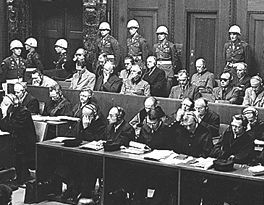
Senator Christopher Dodd’s father, former Senator Thomas Dodd, was a prosecutor at the Nuremburg trials following World War II. In
today’s L.A. Times, Senator Dodd reflects upon his father’s experience.
When we entered World War II, we did not fight for land or for treasure —
we fought for an idea. The idea that laws should rule the land, not men; that
the principles of justice embodied in our Declaration of Independence and
Constitution — of due process, of innocence until proven guilty, of the right to a fair trial — do not get suspended for vengeance.
At Nuremberg, we rejected the certainty of execution for the uncertainty of
a trial. The test was one of principle over power, and the United States passed.
President Harry Truman understood that our nation's ability to bring about
a world of peace and justice was rooted not in our military might but in our
moral authority; not on the ability to compel people with our tanks and planes
but to convince them that our values and our ideals were right. He understood
that our ability to succeed in spreading American values of freedom and human
rights are only as effective as our willingness to uphold them.
Over the last six decades, that moral authority helped persuade more than
half the nations of the world to embrace freedom and free markets. But now that
they are walking with us, why are we walking away from them?
Today, we debate secret prisons, suspension of habeas corpus, warrant-less
searches and wiretaps. The president even asks us to reinterpret the Geneva
accords to sanction the torture of enemy prisoners. Just as the word "Nuremberg"
once defined the United States' moral authority and commitment to justice, what
we risk today is that, one day, the loss of that moral authority and a
commitment to injustice may also be defined by a single word:
"Guantanamo."
Once again, the question is being asked: Why not just give in to vengeance
and show our enemies less mercy than they showed their victims? Why not just
abandon due process and the rule of law and the right to a fair trial?
Because the United States stands for something more.
Now, as then, this nation should never tailor its eternal principles to the
conflict of the moment, because if we do, we will be walking in the footsteps of
the enemies we despise. By abandoning the rule of law, as Congress did last
week, we will lose much more than what we gain.
In the end, it's not about them — it's about us. It's about staying true to
the values and principles that have always made our nation unique.
We would do well to remember the words of Justice Jackson: "We must never
forget that the record on which we judge these defendants today is the record on
which history will judge us tomorrow. To pass these defendants a poisoned
chalice is to put it to our own lips as well."
 Senator Christopher Dodd’s father, former Senator Thomas Dodd, was a prosecutor at the Nuremburg trials following World War II. In today’s L.A. Times, Senator Dodd reflects upon his father’s experience.
Senator Christopher Dodd’s father, former Senator Thomas Dodd, was a prosecutor at the Nuremburg trials following World War II. In today’s L.A. Times, Senator Dodd reflects upon his father’s experience.
1 comment:
And what of Paul O. Douglas's criticism of Nuermburg as a charade masquerading as Justice?
Rehnquist talked about it at the dedication of the Robert Jackson Center.
Rehnquist defends Jackson against Stone and Douglas but Jackson's two adversaries had a point.
Post a Comment